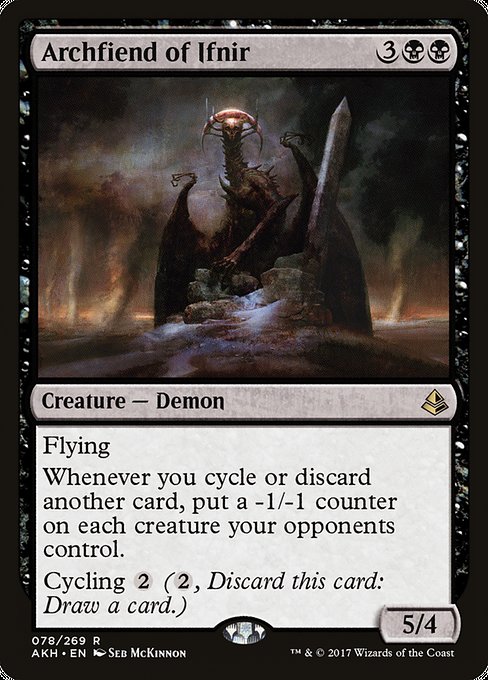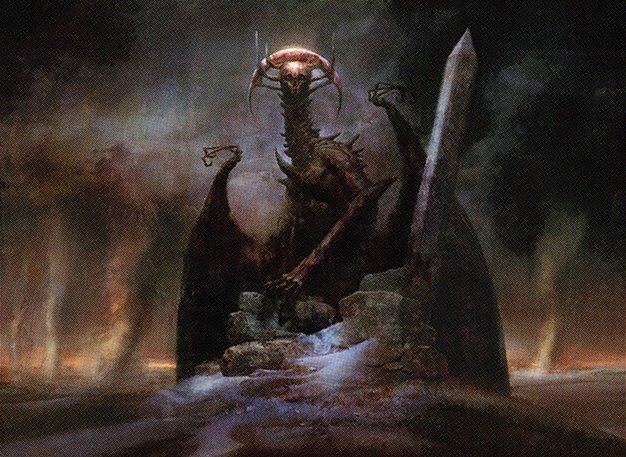Archfiend of Ifnir reads:
Flying
Whenever you cycle or discard another card, put a -1/-1 counter on each creature your opponents control.
Cycling 2
Yes, this is a powerful card. And yes, there are plenty of nifty discard combos and graveyard shenanigans you can get into with this bad mother on the battlefield. However, I want to springboard off this card’s ability and ask this question: At what point do you use Magic as a way to parse through your head, your thoughts, your hates, your loves?

I ask this in regard to Archfiend because, with every card you put into the graveyard, it gives each of your opponent’s creatures a -1/-1 counter. You ping it, you weaken it—much like a poison counter. If you have no qualms about losing your hand, and you have multiple discard outlets, then say goodbye to your opponent’s creatures.
However, as is my tendency, I obsess over how game mechanics reflect “real life.” It makes me think about how we often dump our vital resources in order to hurt others.
I know this isn’t a therapy session, but I can’t help but think about why I have a standing slot on my calendar to play Magic: The Gathering with my friends. Or why we all want so eagerly to win through certain mechanisms. Or why I love discard and inflicting the equivalent of poison counters on all creatures other than mine.
To me, Archfiend of Ifnir as a card represents everything that I hate about myself. I dump what I dislike into a hole and let it poison others around me. The hole in the game is the graveyard.
But the hole in real life can be a hate sink. Drugs, anger, food, the news, politics, our anxieties. Social media. The need to be liked. I know that there’s no one-to-one relationship between the game mechanics and how we go about our lives. Though I can’t help but wonder about the similarities. What does it take to bring others down one point at a time? Throwing away what makes you capable of sustaining yourself. Cycling those potentially viable assets for a better one.

Seb McKinnon’s art for the Archfiend embodies my outlook on this both as a demon and where it seems to reside. A dusty, sandy pit that is crumbling, ruinous, complete with tilted obelisk. And the menacing active tornados that loom behind. I thought maybe “Ifnir” was a word from another country’s lore and cultural mythology (the Amonkhet set is Egyptian in flavor), but the closest I could find through a spoonerism was an Irish/Scots Gaelic word ifrinn, which can variously mean hell, hellish pits, hell’s prison, etc. One hopes that someone at Wizards of the Coast was savvy to this cousinship in words. Ifnir Deadlands has a similar feel. A desert land that is unforgiving and oppressive and which has, I believe, the Archfiend to the left. The card art depicts an obvious hell, even for the demons that scour it.
In a way, Black players love the graveyard because it’s where great effects and abilities can emerge from and resolve into. We love the pit, the hellish wastes, the cardplayer’s Hades. All of this sounds horrible. And that’s because it is—at least that’s what much of the psychology around and behind Magic: The Gathering, including the linguistic repartee, is telling to me.
For example, when one casts a Lightning Bolt, I never hear, “I cast Lightning Bolt at you” but instead “Bolt your face.” We simultaneously embody and enact the card’s text. It is what’s called an illocutionary act. Big words for a small thing. Illocutionary acts are when you order, promise, or warn. (Think of a parent saying, “You’re grounded.” The actual saying of it is the thing itself. Or a licensed official saying, “You are married.”) When we bolt, when we Ponder, when we Thoughtseize, we are doing the thing itself.
So Archfiend of Ifnir gets under my skin in the same way a large splinter does. It reminds me that while I find rebirth in the rot of blackened graveyards rewarding, I’m also likely dumping the best of me into gaping yawns of existential crisis but only pinging those I’m being human with. I’m emptying myself of whatever I don’t want but poisoning my compatriots in the process.
But, see, this is why I love this game. These cards can be more than cards and cut a little too close to home. And we must be careful what we unload for fear of driving our fellow players out of existence.
Kyle Winkler (he/him) is a teacher and fiction writer. While he was a pre-teen when Magic: The Gathering was released, he didn’t start playing until recently. He’s the author of the cosmic horror novella (The Nothing That Is), a collection of short stories (OH PAIN), and a novel (Boris Says the Words). His favorite card is a toss-up between Crypt Rats and Oubliette.

